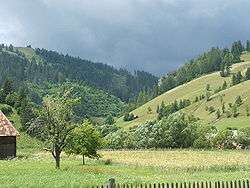
Lunca de Jos
Lunca de Jos (Hungarian: Gyimesközéplok, Hungarian pronunciation: [ˈɟimɛʃkøzeːplok], colloquially Középlok) is a commune in Harghita County, Transylvania, Romania. It lies in the ethno-cultural region Szekely land.
Component villages
The commune is composed of nine villages:
History
The village was historically part of the Székely Land region of Transylvania province. The first peports of settlers in the area was from 1721. It became independent from Gyimesbükk in 1795. The birth registry starts from 1854. The village belonged to Csíkszék district until the administrative reform of Transylvania in 1876, when they fell within the Csík County in the Kingdom of Hungary. After the Treaty of Trianon of 1920, they became part of Romania and fell within Ciuc County during the interwar period. In 1940, the second Vienna Award granted the Northern Transylvania to Hungary and the villages were held by Hungary until 1944. After Soviet occupation, the Romanian administration returned and the commune became officially part of Romania in 1947. Between 1952 and 1960, the commune fell within the Magyar Autonomous Region, between 1960 and 1968 the Mureş-Magyar Autonomous Region. In 1968, the province was abolished, and since then, the commune has been part of Harghita County.

Jos
Jos is a city in the Middle Belt of Nigeria. The city has a population of about 900,000 residents based on the 2006 census. Popularly called "J-town", it is the administrative capital of Plateau State.
The city is located on the Jos Plateau at an elevation of about 1,238 metres or 4,062 feet high above sea level. During British colonial rule, Jos was an important centre for tin mining. In recent years it has suffered violent religious clashes between its Muslim and Christian populations in 2001, 2008, 2010, and 2011.
History
The earliest known settlers of the land that would come to be known as Nigeria were the Nok people (circa 3000 BC), skilled artisans from around the Jos area who mysteriously vanished in the late first millennium.
According to the historian Sen Luka Gwom Zangabadt, the area known as Jos today was inhabited by indigenous tribes who were mostly farmers. According to Billy J. Dudley, the British colonialists used direct rule for the indigenous tribes on the Jos plateau since they were not under the Fulani emirates where indirect rule was used. According to the historian Samuel N Nwabara, the Fulani empire controlled most of northern Nigeria, except the Plateau province and the Berom Mwagavhul, Ng as, Tiv, Jukun and Idoma tribes. It was the discovery of tin by the British that led to the influx of other tribes such as the Hausa, Igbo, Urhobo and Yoruba, thus making Jos a cosmopolitan city.
José
José is a predominantly Spanish and Portuguese form of the given name Joseph. While spelled alike, this name is pronounced differently in each language: in Spanish [xoˈse] and in Portuguese [ʒuˈzɛ] (or [ʒoˈzɛ]). In French, the name José, pronounced [ʒoˈze], is an old vernacular form of Joseph, which is also in current usage as a given name. José is also commonly used as part of male name composites, such as José Manuel, José Maria or Antonio José, and also in female name composites like Maria José or Marie-José. José is also a Belgian Dutch male given name, pronounced [ʒoːˈzeː], and for which the female written form is Josée as in French. In Netherlandic Dutch however, José is a female given name, and is pronounced [ˈjoːseː]; it may occur as part of name composites like Marie-José or as a female first name in its own right; it can also be short for the name Josina and even a Dutch hypocorism of the name Johanna.
In England, Jose is originally a Romano-Celtic surname, and people with this family name can usually be found in, or traced to, the English county of Cornwall, where it was especially frequent during the fourteenth century; this surname is pronounced /ˈdʒoʊz/, as in the English names Joseph or Josephine.
Jos (disambiguation)
Jos is a city in Nigeria's middle belt.
Jos may also refer to:
In Nigeria
People
Other uses
See also
Podcasts:

